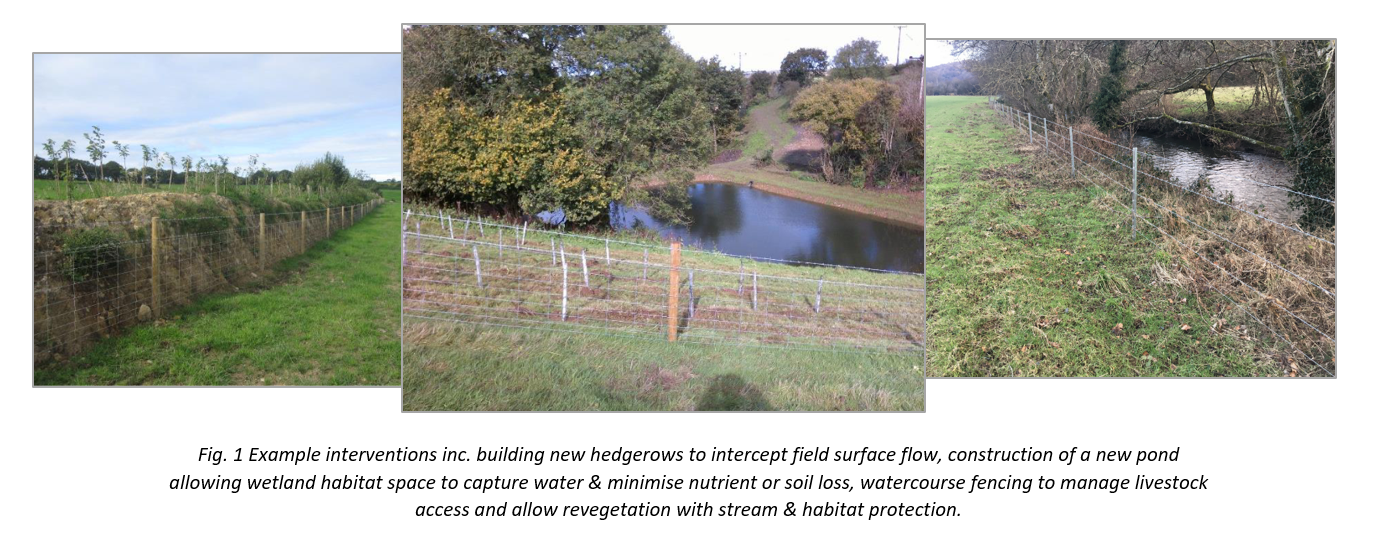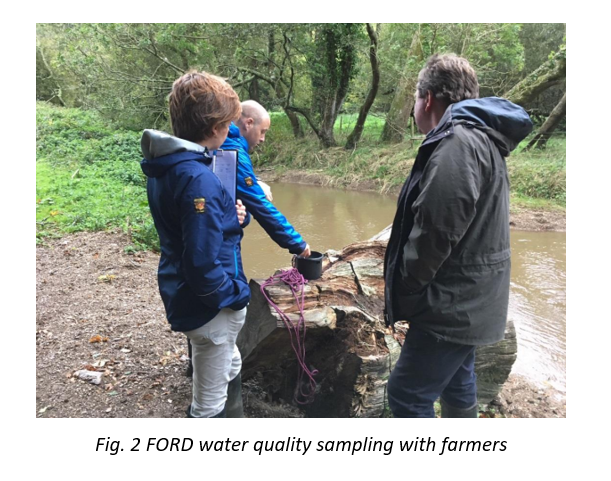2020 saw considerable activity in both pilot catchments for Westcountry Rivers Trust (WRT) in the UK, which are progressing discussions with landowners around the provision of PES as sellers – and with interested parties as potential buyers of services, including the Private Sector.
In the Lyd catchment, WRT concluded the NatureBid online auction leading to contracts with 23 farmers or landowners for intervention works that supported improvements or protection of water quality, but also water retention, soil health & infiltration, biodiversity, and Carbon sequestration. This fund of £95,000 was made available via a group of Private sector contacts working with WRT via the Tamar Water Stewardship Business Board https://wrt.org.uk/tamar-water-stewardship-business-board/ to protect and bolster the resilience of the catchment which supports their supply chains. The majority of contracted NatureBid works have now been completed (Fig. 1), with a full evaluation of the level of investment to be assessed against the initial support fund in 2021.

The Business Board have continued regular meetings and developed a number of individual satellite activities with WRT including further Carbon offset woodland planting donations (16,000 in 2020 + 7,000 in 2021), direct one-to-one ‘Farm Health Checks’ providing tailored advice for best practice in economic & environmental provision, mapping and evaluating supply chains in a catchment and how to approach collaboratively to maximise opportunities – especially with a changing Agricultural Policy agenda. The Board have worked with WRT to produce a regular blog communication, interviewing members to clarify how water protection and catchment delivery is important to their business operations; this is communicated internally direct to their primary producers, within their Business operation and externally to wider audiences including the public. Several Companies have also held separate discussions with WRT with a view to understand potential opportunities for their own operations from producers to consumers. As one of the Courtauld 2025 Water Ambition pilots, WRT feeds back to and attends the national steering group which includes representatives from numerous retailers, including all the major UK supermarkets.
On the Gara catchment, WRT secured a second round of funding working in partnership with DEFRA family (Environment Agency & Natural England / Catchment Sensitive Farming) via WEIF (Water Environment Improvement Fund), to target improvements in water quality &/or protection of water-dependant designated sites. To date these two Rounds have amounted to £25,000 which are offered out for on-farm interventions for water quality and biodiversity improvements – and was increased from original levels due to demand and evidenced wider benefits from outcomes. This relatively small catchment (32 km²) demonstrated good levels of interest, having engaged all the key landowners, with Round 1 of WEIF more than matched at 133% of farmers own investment. Round 2 is contracted for delivery by Spring 2021.
In addition to the main intervention contracts, WRT has included a water quality monitoring requirement of the farmers working alongside Advisors (Fig. 2). This is an offshoot of WRTs Citizen Science activity, aimed directly at farmers; FORDS (Farmer Owned River Data) encourages them to use the simple monitoring kit provided to undertake sampling which provides greater insight for them into local watercourse conditions – and importantly, how these may change or reflect weather events or farm & field activity. The data is uploaded to a closed group webpage so that the farmers themselves can confidently compare or track results in their group, supported by WRT Advisors. This first-hand knowledge is designed to promote greater awareness of water quality conditions, and trust in data due to their direct involvement. WRT will carry out a later analysis of results and feedback with the farmers – provisionally planned as a CPES event per catchment in April 2021 (subject to Covid-19). 
In both catchments the WRT Advisors have been working closely with landowners, often remotely due to Covid-19 restrictions, to highlight opportunities and gather farm & environmental data towards evaluation of catchment conditions and outcomes. This has included wider sampling to quantify Soil Organic Carbon (SOC) as a fundamental indication of soil and catchment health, its ability to absorb, filter and buffer strongly influences watercourse conditions as the receiving body. WRT have been able to develop links to wider interests in this subject including academics & researchers to potentially trial alternative monitoring technology, assisted by the imminent publication of a scientific paper which documents progress on the protocol which WRT contributed to and links current sampling to evaluate potential on farms. The focus and topical nature of the Climate Emergency has meant the potential for Carbon markets is extremely high with multiple interests emerging, however, WRT has been directly involved since 2015 and have practical, working experience including contributing to a potential Soil Carbon Code via a partnership. Therefore, the reality of a PES market for water quality protection may be directly achieved via linkage to that of Carbon and/or other ES provision – which perfectly reflects WRT’s holistic ecosystem approach on a catchment scale and the ability to broker these services between interested buyers & sellers.
Across the pilot catchments, WRT’s ambition is to produce individual farm reports which aim to capture current and potential evaluations of Natural Capital provision; hence to identify viable opportunities for PES as part of the farm business. The development of this data capture & reporting template has been established, but farm visits and detailed data collection impacted by Covid-19 restrictions. Currently a scaled back report is being utilised to reflect activity with an ambition to expand to full versions as & when possible subject to Covid-19 or CPES extension in 2021. Furthermore, the full suite of interventions carried out in each pilot area will be evaluated in 2021 to quantify full levels of investment against initial support provided alongside the Natural Capital assessment from the plans – designed to assess at both farm and catchment scale. Via the Courtauld 2025 group of Companies, WRT will also be evaluating interventions using the Replenish tool (developed to assess volume of water returned to a catchment following use by business abstraction and in operations – since redesigned to also assess for water quality).


